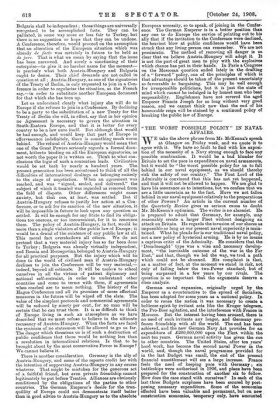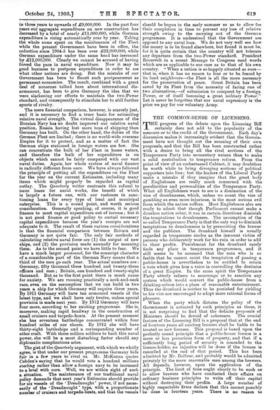"THE WORST POSSIBLE POLICY" IN NAVAL AFFAIRS.
WE take the above phrase from Mr. McKenna's speech at Glasgow on Friday week, and we quote it to agree with it. We have no fault to find with his exposi- tion of the necessity of a Navy strong enough to face any possible combination. It would be a bad blunder for Britain to set the pace in expenditure on naval armaments, but it would be "the worst possible policy for us to fall behind in our naval equipment, as we should thereby risk the safety of our country." The First Lord of the Admiralty is convinced that this has not yet happened, and that it will not be allowed to happen. We are glad to have his assurance as to intentions, but we confess that we are a little uncertain as to the fact. Have we not fallen behind in our naval equipment relatively to the preparations of other Powers ? An article in the current number of the Quarterly Review gives us serious cause to doubt Mr. McKenna's optimism. The writer is no alarmist. lie is prepared to admit that Germany, for example, may reasonably create a larger Fleet without designing an attack on Britain. He regards the invasion of our shores as impossible so long as our present naval superiority is main- tained. What he pleads for is our traditional naval policy, not a new policy of hysterical arming. He is by no means a captious critic of the Admiralty. He considers that the 'Dreadnought' type was a wise and necessary develop- ment, "the inevitable outcome of the war in the Far East," and that, though we led the way, we trod a path which could not be shunned. His complaint is that, as a matter of fact, at the moment we stand in risk, not only of falling below the two-Power standard, but of being surpassed in a few years by our rivals. The question is so important that the arguments deserve a close analysis.
German naval expansion, originally urged by the Emperor as a counteractive to the spread of Socialism, has been adopted for some years as a national policy. In order to rouse the nation it was necessary to create a bellicose spirit by irritant acts like the Kruger telegram, the Pro-Boer agitation, and the interference with France in Morocco. But the interest having been aroused, there is no need of such irritants any longer, and Germany pro- fesses friendship with all the world. The end has been achieved, and the new German Navy Act provides for an expenditure of £200,000,000 upon the Fleet within the next ten years. German naval activity has given the cue to other countries. The United States, after ten years' hard work, has become the second naval Power in the world, and, though the naval programme provided for in the last Budget was small, the end of the present financial unsettlement will see a large increase. France feels the need of keeping pace with Germany ; six battleships were authorised in 1906, and. plans have been prepared for the construction of another six to follow. How does the case stand with ourselves ? In each of the last three Budgets surpluses have been secured by post- poning necessary expenditure. Some of the economies effected have been valuable and permanent, but on new construction economies, temporary only, have amounted in three years to upwards of £9,000,000. In the past four years our aggregate expenditure on new construction has decreased by a total of nearly £11,000,000, while German expenditure is rising automatically year by year. Taking the whole sums spent on the maintenance of the Fleet while the present Government have been in office, the reduction since 1904-5 has been over £22,000,000, while German expenditure under the same head has increased by £12,000,000. Clearly we cannot be accused of having forced the pace in naval expenditure. Now it may be good business to postpone expenditure in order to see what other nations are doing. But the mistake of our Government has been to flaunt such postponement as permanent economies. The result, combined with a great deal of nonsense talked here about international dis- armament, has been to give Germany the idea that we were slackening our efforts to maintain the two-Power standard, and consequently to stimulate her to still further spurts of rivalry.
The mere financial comparison, however, is scarcely just, and it is necessary to find a truer basis for estimating relative naval strength. The virtual disappearance of the Russian Navy has no doubt improved our relative naval position, Russia having lost more tons of shipping than Germany has built. On the other hand, the duties of the German Fleet are limited; there is no world-wide overseas Empire for it to protect, and as a matter of fact the German ships stationed in foreign waters are few. She can concentrate the bulk of her Fleet in home waters, and therefore the bulk of her expenditure is on objects which cannot be fairly compared with our vast naval duties. Again, her whole system of naval finance is radically different from ours. We have always followed the principle of putting all the expenditure on the Fleet for the year on the current Estimates, including many items which might properly be regarded as capital outlay. The Quarterly writer contrasts this refusal to issue loans for naval works, the benefit of which is largely a future one, with our rashness in sanc- tioning loans for every type of local and municipal enterprise. This is a sound point, and worth serious consideration. Generally speaking, of course, it is good finance to meet capital expenditure out of income ; but it is not good finance or good policy to curtail necessary capital expenditure because the year's receipts are not adequate to it. The result of these various considerations is that the financial comparison between Britain and Germany is not quite fair. The only fair methods of calculating relative naval force are (1) the output of new ships, and (2) the provision made annually for manning them. As to the second point we have little to fear. We have a much larger personnel, for the conscript character of a considerable part of the German Navy means that a third of the men go each year. The actual numbers are : Germany, fifty thousand three hundred and twenty-three officers and men ; Britain, one hundred and twenty-eight thousand. But as to the first point there is much cause for anxiety. We are running practically a neck-and-neck race, even on the assumption that we can build in two years a ship for which Germany will require three years. By 1911 Germany will have ten armoured vessels of the latest type, and we shall have only twelve, unless special provision is made next year. By 1912 Germany will have four more, according to her existing programme. She is, moreover, making rapid headway in the construction of small cruisers and torpedo-boats. At the present moment she has seventeen battleships concentrated within four hundred miles of our shores. By 1912 she will have thirty-eight battleships and a corresponding number of other craft. With three million soldiers to back this naval power, she will be a most disturbing factor should any diplomatic complications arise.
The gist of the Quarterly argument, with which we wholly agree, is that under our present programme Germany bids fair in s, few years to rival us. Mr. McKenna quotes Cobden's saying that he would vote a hundred millions sterling rather than allow a foreign navy to be increased to a level with ours. Well, we are within sight of such a situation. The maintenance of our traditional naval policy demands that next year's Estimates should provide for six vessels of the ' Dreadnought ' power, if not neces- sarily of the ':Dreadnought' type, with a proportionate number of cruisers and torpedo-boats, and that the vessels should be begun in the early summer so as to allow for their completion in time to prevent any loss of relative strength owing to the carrying out of the German programme. It is understood that the Government are opposed to any naval loan. We do not very well see how the money is to be found elsewhere, but found it must be, for it is quite certain that the country will not tolerate any departure from the two-Power standard. President Roosevelt in a recent Message to Congress used words which are as applicable to our case as to that of his own country. "When a nation is so happily situated as ours— that is, when it has no reason to fear or to be feared by. its land neighbours—the Fleet is all the more necessary for the preservation of peace. Great Britain has been saved by its Fleet from the necessity of facing one of two alternatives,—of submission to conquest by a foreign Power, or of itself becoming a great military Power." Let it never be forgotten that our naval supremacy is the price we pay for our voluntary Army.















































 Previous page
Previous page